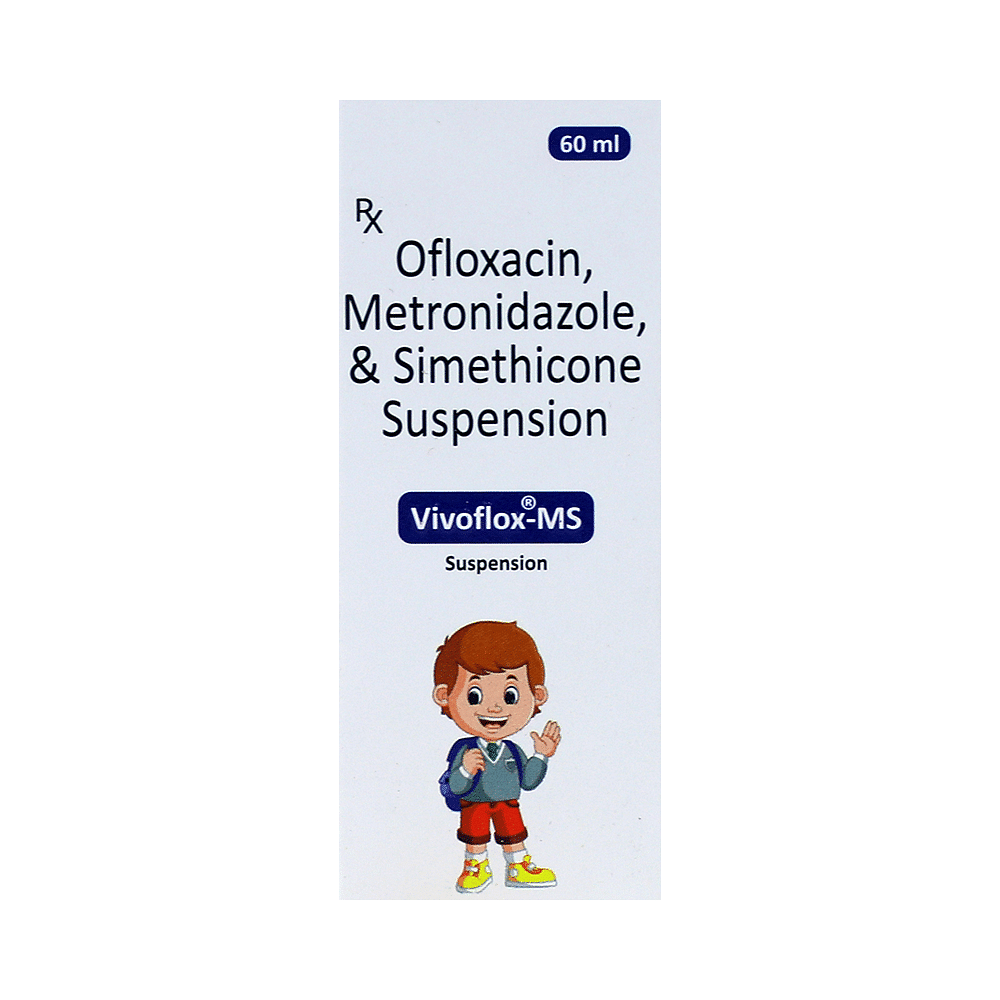
Flosep-MS Oral Suspension
Manufacturer
Sepik Life Sciences
Salt Composition
Ofloxacin (50mg) + Metronidazole (120mg) + Simethicone (10mg)
Key Information
Short Description
Flosep-MS Oral Suspension is given to children for the treatment of bacterial infections of the teeth, lungs, gastrointestinal tract, urinary tract, and genital tract.
Dosage Form
Oral Suspension
Introduction
Flosep-MS Oral Suspension is a combination of three active ingredients: ofloxacin, metronidazole, and simethicone. It is used to treat bacterial infections in children, including those of the teeth, lungs, gastrointestinal tract, urinary tract, and genital tract. This medicine is also given as an empirical antibiotic for infected diarrhea mixed with blood and serious infections like peritonitis.
Directions for Use
Flosep-MS Oral Suspension should be given to children as directed by the doctor. It is important to complete the full course of treatment, even if symptoms improve before finishing the medicine.
How it works
Flosep-MS Oral Suspension works by interfering with the genetic material of bacteria, killing the infection-causing bacteria and preventing its growth and stopping the infection. Simethicone, a gas-absorbing agent, helps to remove gas bubbles and provides relief in stomach pain and bloating.
Quick Tips
Diarrhea is a common side effect. Make sure your child drinks plenty of water. Your child may have an altered taste or furry tongue after taking Flosep-MS Oral Suspension. Eating citrus fruit or sipping plenty of water or fruit juice may help. Do not give any calcium, magnesium, iron, vitamin, or antacid within 2 hours of taking Flosep-MS Oral Suspension as these can affect the absorption of the medicine. Never use this medicine for the common cold and flu as they are caused by viruses and Flosep-MS Oral Suspension treats only bacterial infections. Discontinue Flosep-MS Oral Suspension and inform the doctor immediately if your child develops a rash, itchy skin, swelling of face and mouth, or has difficulty in breathing.
Related Medicines

Mexaflox OZ Oral Suspension

Olist M Oral Suspension

Vivoflox-MS Oral Suspension

Poflox MS Oral Suspension

O2Or M Oral Suspension

Atlox-MZ Plus Oral Suspension

Haycin MS Oral Suspension

Joflo M Oral Suspension

Viriflox-M Oral Suspension

Floxcis M Oral Suspension
Frequently asked questions
What information should I provide to the doctor before giving Flosep-MS Oral Suspension to my child?
It is essential to inform the doctor if your child has a history of heart disease, seizures, psychiatric disorders, diabetes, photoallergy, neuromuscular disorders, rheumatoid arthritis, or genetic disorders involving blood vessels, as Flosep-MS Oral Suspension may exacerbate these conditions and lead to complications.
Can Flosep-MS Oral Suspension be taken with cough and cold medicines?
No, it is not recommended to give Flosep-MS Oral Suspension with cough and cold medicines, as one of its ingredients can interact with alcohol-containing medicines, leading to a disulfiram reaction, causing symptoms such as nausea, vomiting, flushing, dizziness, and others.
What should I do if I accidentally give an overdose of Flosep-MS Oral Suspension to my child?
An extra dose of Flosep-MS Oral Suspension is unlikely to cause harm. However, if you suspect an overdose, consult a doctor immediately. Overdose may lead to side effects such as seizures, tremors, severe headache, sudden weakness, blood cell abnormalities, and rapid and irregular heartbeat. Seek medical attention if you notice any of these symptoms.
What should I do if my child shows no improvement after taking Flosep-MS Oral Suspension for the prescribed duration?
If your child does not show improvement, it may indicate that Flosep-MS Oral Suspension is ineffective against the infection-causing bacteria. In this case, consult your child's doctor, who may prescribe an alternative antibiotic with higher efficacy against the disease-causing bacteria. In some cases, the antibiotic may need to be administered via an IV route in a hospital setting.
Can other medicines be taken with Flosep-MS Oral Suspension?
Flosep-MS Oral Suspension can interact with other medicines or substances. Inform your doctor about any other medicines your child is taking before starting Flosep-MS Oral Suspension. Additionally, consult your child's doctor before giving any medicine to your child.
How should Flosep-MS Oral Suspension be stored?
Store Flosep-MS Oral Suspension at room temperature, in a dry place, away from direct heat and light. Ensure that all medicines are kept out of reach and sight of children to prevent accidental consumption.
Can my child receive vaccinations while taking Flosep-MS Oral Suspension?
Antibiotics usually do not interfere with vaccine ingredients or cause adverse reactions in children who have recently been vaccinated. However, children taking antibiotics should not receive vaccinations until they have recovered from the illness. Once your child feels better, the vaccine can be administered.
Why is my child passing red-brown urine after taking Flosep-MS Oral Suspension?
Flosep-MS Oral Suspension contains metronidazole, which can cause red-brown urine as a side effect. This is not a pathogenic condition and will subside once the medicine is discontinued after completing the treatment.


